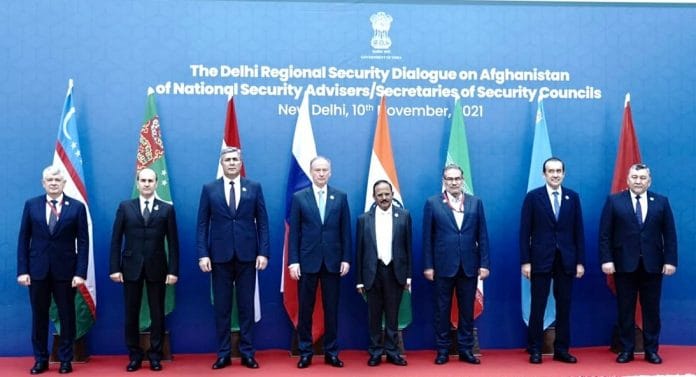The third meeting of the Regional Security Dialogue on Afghanistan, held in New Delhi, flagged some serious security challenges to the region. India’s wish list for the Taliban was unveiled by National Security Advisor Ajit Doval during his meeting with the NSAs of seven other countries – Kazakhstan, Kyrgyzstan, Tajikistan, Uzbekistan and Turkmenistan, Iran and Russia. Both China and Pakistan were invited but didn’t attend.
The Delhi Declaration, a joint statement issued after the meeting of security heads of these eight countries, highlighted the need for “collective cooperation” against terrorism and drug trafficking. Going by the ground reality, although the Taliban is in control of Kabul, other regions of Afghanistan seem to be divided between local tribal fighters and the Talban’s central command. As it is, the Taliban’s central command does not appear to be a firmly structured unit. There are fissures and contradictions among the current leadership. This poses a serious challenge to any country that wants to gain a foothold in Afghanistan either for humanitarian assistance or any security related activity. However pious the Delhi Declaration may sound, it is a near-impossible task at this uncertain juncture for any of these eight countries to provide “unimpeded, direct and assured” humanitarian assistance.
Visas, food and borders
The problems relating to visas for Afghan citizens appear to have been discussed at length in the Regional Security Dialogue. The Narendra Modi government is understood to be considering each case on the basis of merit, medical urgency and security parameters. But the Indian consular team in Kabul is small, consisting mostly of local staff. More importantly, the meeting should have considered the plight of Afghan students who had returned to their homes before the US withdrawal and Taliban takeover of Kabul. Thousands of Afghan students studying in various Indian universities are unable to join their courses either in person or attend colleges in virtual mode. Also, there are Afghan students here who are totally cut off from their families back home. They are probably left with very little or no money to even pay their fees, let alone spend on food and shelter. The concerned ministries should attend to their problems on urgent basis, issue visas to stranded students and facilitate their return to studies. Those who are already here should be retained and allowed to pursue their studies unhindered. These students are verily our assets, who will eventually become bridges between the two countries and societies.
The emphasis on assistance “in a non-discriminatory manner across all sections of the Afghan society” assumes greater importance as it is widely acknowledged that the Taliban regime in Kabul has not been able to put together an inclusive administration. The banking institutions have folded up or failed to carry out their functions in the wake of the sudden US withdrawal and the collapse of the elected Ashraf Ghani government. The chaotic condition has also affected the food and civil supplies. Kabul and other major cities could witness food riots anytime in the future. And there is the risk of smaller tribal areas slowly becoming administratively independent units.
The Central Asian countries have another challenge of mercenary terror groups operating from their soil. Of the seven countries that attended the NSA meeting in New Delhi, Tajikistan, Turkmenistan and Uzbekistan share borders with Afghanistan and hence face huge problems of refugee influx and movement of militants. Their economic woes have been compounded by the crippling Coronavirus pandemic, debt burden and acute energy shortage. It is likely that they may stop supplying electricity to Kabul, which has defaulted on payments and will not be able to foot huge bills in future. Besides, every one of the Central Asian countries have their own unique equations and problems with the Taliban. Uzbekistan requires the road links in Afghanistan to reach out to the South Asian markets. The Tajiks form a major minority in Afghanistan and expect a fair share of participation in the power setup in Kabul.
Also read: Terrorism, women’s rights, humanitarian aid — Taliban gets stern message from Delhi NSA meet
India needs assertive strategy
India expects the Taliban to become more inclusive and accommodate representatives of Shia Hazaras, Uzbeks, Tajiks, and, most importantly, the women of Afghanistan in the government. It wants the Taliban to seek legitimacy with Afghanistan before seeking recognition from the world community. This appears to be a pointless expectation because two countries, China and Pakistan, not only skipped the meeting called by India, but also wield much greater influence on the Taliban. They want New Delhi out of the scene in Afghanistan. Pakistan is hosting a trilateral on Afghanistan to be attended by China, Russia, the US and representatives of the Taliban.
No country will be able to provide the security cover and platform for humanitarian assistance to Afghanistan like the US did. With China and Pakistan appropriating the entire strategic space vacated by the US, there seems to be very little elbow room for India to operate and secure its strategic space there. The Delhi Declaration’s intentions can translate into action only if we change our strategy to a more emphatic and assertive one. But that needs superior planning and efficient execution with diplomatic finesse and military precision.
Seshadri Chari is the former editor of ‘Organiser’. Views are personal.
(Edited by Neera Majumdar)






